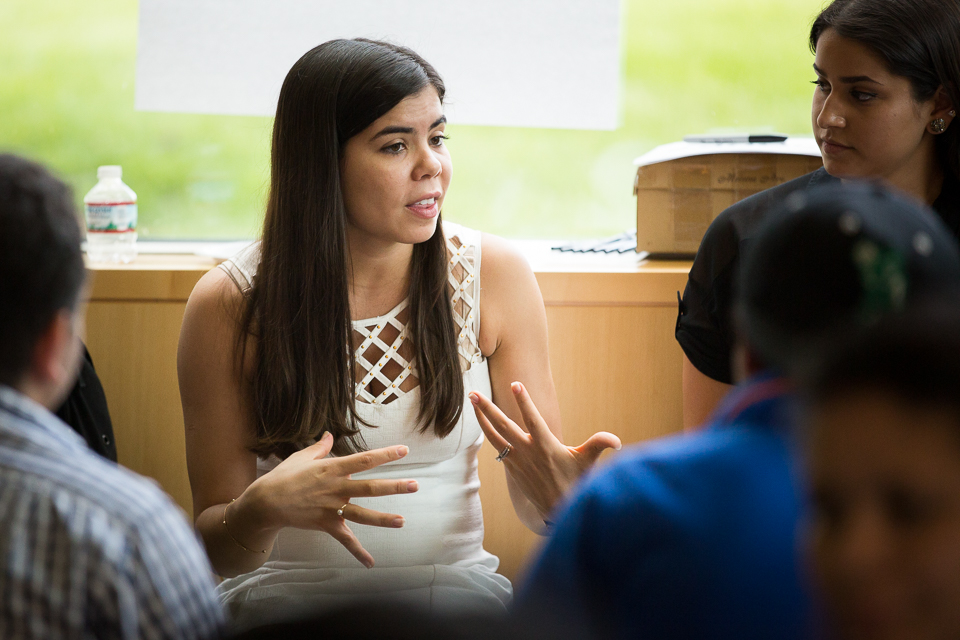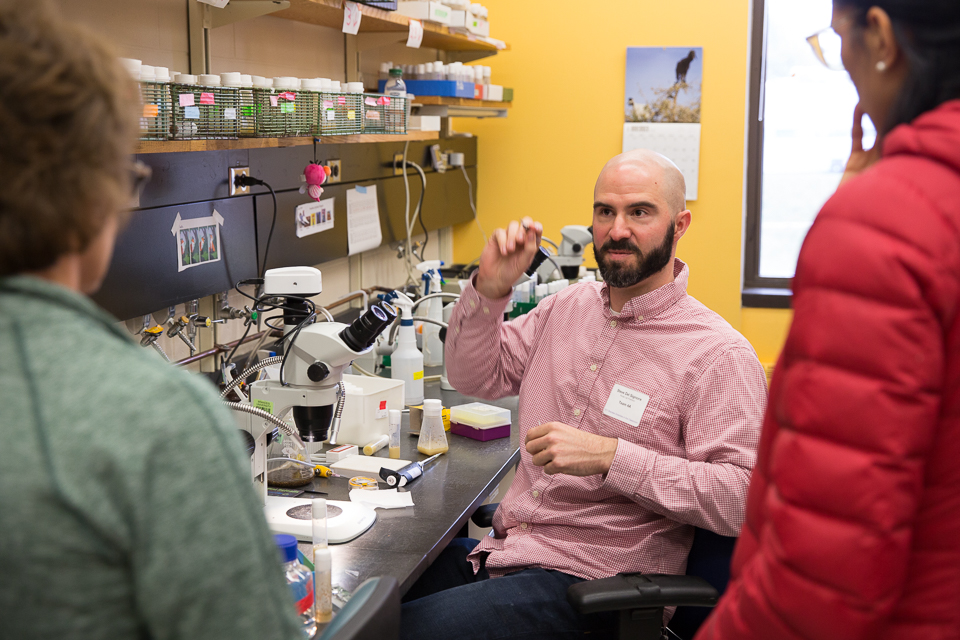Graduate Researchers at Brandeis Use Their Scientific Research to Inspire Local High School Students

Photo Credit: Simon Goodacre
November 17, 2017
Simon Goodacre | Graduate School of Arts and Sciences
For almost three years, PhD candidates in the sciences have been collaborating with Waltham Public Schools to share their research with local middle and high school students. Anique Olivier-Mason, PhD’12, coordinates the program “to share the who, what and why of science” with these students in the hopes that it will encourage them to consider pursuing careers in STEM fields.
Vivekanand Vimal, PhD’17, a former teacher at Waltham High School (WHS), first organized a brainstorming session among Waltham teachers and students and Brandeis staff and students in January, 2015. At that meeting, Olivier-Mason, who is the Director of Education, Outreach and Diversity at the Materials Research Science and Engineering Center (MRSEC), and Marisa Maddox, a Biology teacher at WHS, discussed bringing Brandeis researchers and local students together. “After the first inspiring presentation by a Brandeis scientist, and a positive response from WHS students, we knew we were on to something,” says Maddox, and they established an ongoing program.
After securing funding from the MRSEC (pronounced “mer-seck”), Olivier-Mason began arranging regular opportunities for local science students and teachers to visit laboratories at Brandeis and organizing sessions and courses where high school students can meet graduate researchers. The MRSEC is an interdisciplinary enterprise sponsored by the National Science Foundation that seeks to augment Brandeis’ existing expertise in experimental and theoretical techniques across the physical and life sciences to create new materials that are constructed from simplified components. Another aspect of their mission is to broaden participation of underrepresented demographics in science. More than 47% of students at Waltham High School represent underrepresented minorities in STEM, and Olivier-Mason hopes that their sessions with Brandeis researchers will encourage them to consider careers in science. “I realized that many young people need help ‘seeing’ themselves as working scientists because of the prevalent negative—and often inaccurate—stereotypes about the types of people who pursue science,” she says.
One particularly successful program has been the “Pizza Talk” series, which is an opportunity for high schoolers to hear about the researchers’ journeys into science. “The Pizza Talks have become a staple at the high school,” says Maddox. “We started with about thirty students consistently attending and four years later, we are around one hundred students attending monthly. Students now ask me every week when the next talk will be, and the second I hang the sign-up sheet on my door, there is a rush to write their name in.”
The researchers who participate in the program are pursuing a variety of doctoral degrees inside and outside the MRSEC. “The Brandeis graduate students have such diverse backgrounds and alternative paths into science and college, and our WHS students can see themselves in these presenters,” says Maddox. Laura Laranjo, a fourth-year PhD candidate in Molecular & Cell Biology, was invited to talk about her research at WHS and has been involved in the effort ever since. Coming from a family of Brazilian Presbyterian missionaries, she was very enthusiastic about the opportunity to deconstruct the stereotypes of what a scientist looks like. “When I was in high school I was discriminated against by the way I looked and talked,” she says, “and I remember how important it was for me to have my teachers’ support. I wanted to be that role model for someone else, and it is so rewarding to see young adults look interested in my story.”

Photo Credit: Simon Goodacre
Maddox notes that many of her students comment on “the struggles in their lives and how the presenters faced similar challenges.” One such presenter is Raul Ramos, a PhD candidate in Neuroscience, who got involved in the program because he was looking for a way to promote science awareness and education “that would be real and tangible.” He believes “anyone, regardless of their background, can find success in science,” and he hopes that local students will be inspired by his own unusual journey to Brandeis. “I am going to continue to work with the Waltham community and see where it takes me,” he says.
The program is of mutual benefit to the researchers, many of whom seek to gain valuable teaching and communication experience. “Working with schoolchildren reminds me to go back to the basics,” says Laranjo, “to talk without using fancy words, and to just be me, not the PhD candidate, but just a girl who loves science.” The researchers work closely with WHS faculty to ensure their talks are relevant to classroom material that is familiar to the students. “Each speaker receives one-on-one coaching to prepare for their talk,” says Olivier-Mason, “so participating scientists gain practical science communication skills that will help them advance in their careers.” “I'm always impressed with their communication skills and professionalism,” adds Maddox.
Of course, the most rewarding aspect of the program is having the opportunity to inspire local students. Laranjo recalls a particularly memorable visit to WHS when a student approached her after she gave her talk. “She came, hugged me and cried.” The student said she was on the verge of not even applying to college because other people had told her that she did not belong there. But she asked Laranjo, “If you can do it, why can’t I?” “There are very few moments in my life that I feel like I accomplished a lot,” says Laranjo, “but if I had to go through everything I went through again just to make these children believe in themselves, then it was completely worth it!”






